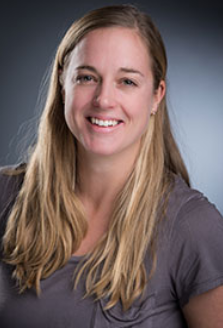Physician Assistant, Reno Tahoe Pain Associates

"I had awesome relationships with my professors and other faculty members. I still keep in touch with some of them today. They have written me letters of recommendation and have helped me pursue my current career."
Britt Bickert is a biology and exercise science graduate who went on to pursue graduate school to become a physician assistant. Today, she is a physician assistant (PA) specializing in physiatry at Reno Tahoe Pain Associates, where she helps to restore functional ability and quality of life to those with physical impairments or disabilities affecting the brain, spinal cord, nerves, bones, joints, ligaments, muscles, and tendons. In her current role, she aims to maximize patients’ independence in daily activities and provides procedures like epidurals, joint injections, trigger injections, and more. We sat down with Britt to discuss her CSP experience including how her relationships with faculty during her undergraduate pre-professional studies helped her find her path to becoming a PA.
Q: What were your most important factors to consider when choosing a college?
A: The most important factors to me were the student population size and student to professor ratio, programs, and location. I think professor/student relationships create a quality academic experience. Creating a good relationship with your professor allows you to ask more questions and pursue a subject further which leads to better education.
Q: Share a favorite moment from your time at CSP.
A: I have many great moments at CSP, so it’s hard to choose one! A very important moment that occurred during my time there was during my freshman year. I was still deciding on what I truly wanted to study and during my biology class, my professor pulled me aside and told me she thought I had a bright future in biology. Turns out she was right. I ended up studying biology, specifically human sciences, and loved it!
Q: Concordia’s campus is in an urban, diverse location. In what ways did these campus attributes help prepare you for your career?
A: I grew up in a very small, rural town in Wisconsin, so I had many new experiences in the Twin Cities. I was able to experience a vast array of different cultures and beliefs. In my career, I deal with people from different backgrounds and beliefs, so my experiences at CSP helped me tremendously.
Q: Do you feel that you established significant relationships with the faculty? What importance did those relationships have in the quality of your classroom experience?
A: I had awesome relationships with my professors and other faculty members. I still keep in touch with some of them today. They have written me letters of recommendation and have helped me pursue my current career. I always felt comfortable contacting them and they were always happy to help. The quality of my classroom experience was second to none.
Q: Did you participate in any volunteer opportunities or internships? How do you feel those experiences prepared you for professional success and a career after graduation?
A: During my time at CSP, I volunteered at Regions Hospital in St. Paul. I volunteered in the physical therapy department and helped patients with exercises and kept the therapy gym clean. I also was a tutor for CSP for biology. These experiences helped me apply what I learned in the classroom and further solidify my knowledge. I also gained more appreciation for volunteers.
Q: Did you pursue any extracurricular activities, athletics, committees, or groups during your time at CSP? What was your experience like?
A: I was on the track team during my time at CSP. I was also a part of the Tetra Delta group and worked as a lab assistant in the biology lab. Both helped me apply what I learned in my chemistry and biology courses. It gave me the confidence to apply to graduate school and further pursue a career in the health field.
Q: What are your next steps? Do they include continuing education, certifications, or diving deeper into another element of your career?
A: To maintain my current PA license, I need to have continuing education credits. I plan on attending sports medicine and orthopedic conferences this year.
Q: In what ways do you feel CSP prepared you to pursue PA school?
A: The challenges of my biology and chemistry courses helped me to prepare for the amount of studying I needed to do in PA school. I call it “brain endurance.” I feel the quality of my education helped me with the success I had in PA school.
Q: If you could give advice to a student who wants to pursue a similar career path, what would it be?
A: Work hard during your undergraduate studies because it’s very competitive to get into PA school. A high score on the GRE is very helpful! Also, spend time shadowing various medical professionals and ask a lot of questions. This will help you network and the professionals you shadow are usually very happy to write letters of recommendation. It is also beneficial to work in the medical field before applying to PA programs because they want applicants with medical experience and hours.